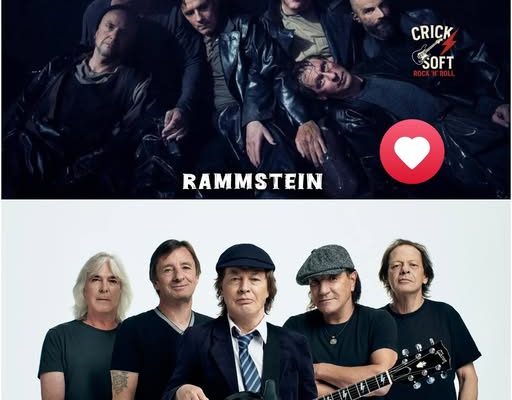Rammstein vs. AC/DC: Why the German Titans Edge Out the Aussie Legends in the Ultimate Rock Face-Off
In the pantheon of rock and metal, there are legends—and then there are forces of nature. Few match the legacy and firepower of AC/DC, the Australian juggernaut that defined hard rock across generations with schoolboy outfits, thunderous riffs, and anthems that filled stadiums and echoed across continents. But in the ever-evolving world of music, even giants can be challenged—and today, it’s Germany’s industrial-metal titans Rammstein who are not just matching AC/DC’s power, but edging past them in ways the rock world can no longer ignore. This is Rammstein vs. AC/DC, and the verdict is shaking the foundations of global rock culture.
Let’s not pretend this is an easy comparison. AC/DC has been a household name for decades, delivering timeless classics like “Back in Black,” “Highway to Hell,” and “Thunderstruck.” They’ve become shorthand for raw, stripped-down, no-nonsense rock and roll. Angus Young’s duckwalk is instantly recognizable, and their sound—simple yet thunderous—has powered more parties, road trips, and bar fights than any other. But there’s a turning point in every legend’s tale. And while AC/DC’s name remains etched in history, Rammstein has emerged not just as a modern peer—but as a dominant cultural force that, in today’s world, might just be the bigger beast.
How did this happen? How does a German band singing almost exclusively in their native language command a global presence that rivals and, in many ways, surpasses a band as universally beloved as AC/DC? The answer lies in a perfect storm of visual artistry, musical innovation, unapologetic identity, and a willingness to evolve while staying dangerous—something AC/DC, for all their greatness, has famously avoided.
Rammstein’s rise is the stuff of legends. Formed in the post-reunification chaos of 1994 Berlin, their sound was immediately unlike anything in mainstream rock. Brutal, industrial, theatrical, and chillingly beautiful—Rammstein wasn’t here to make you feel comfortable. They were here to scorch your senses. And they succeeded. With every album, from Herzeleid to Zeit, they crafted not just songs but atmospheres—sonic architecture designed to confront, mesmerize, and overwhelm. AC/DC gave you riffs. Rammstein gave you a world.
But perhaps the most seismic difference is found on stage. AC/DC’s live shows are iconic—but Rammstein’s are something else entirely: they’re modern myth. Where AC/DC brings swagger, Rammstein brings spectacle. We’re talking flamethrowers, exploding stages, rotating treadmills, fire-breathing microphones, and enough pyrotechnics to require military-grade fire marshals in every country they visit. No band on Earth puts more effort into making every show feel like a once-in-a-lifetime event. Every concert is an assault on the senses, a hyper-controlled chaos that fuses theatre, metal, and political commentary into something so visceral that even people unfamiliar with the music walk away transformed. Rammstein doesn’t perform; they engulf.
Another major edge Rammstein holds is their refusal to conform to any Anglo-American standard. Singing in German, exploring themes that border on taboo, and refusing to cater to radio-friendly formulas, they have still amassed a global fanbase that includes non-German speakers who sing every word regardless of comprehension. Their music transcends language. AC/DC, on the other hand, has remained locked in a sonic time capsule. Their formula hasn’t changed since the late 1970s, and while that consistency has earned them diehard fans, it also raises questions about artistic evolution. Rammstein dares to challenge themselves—and their audience—with every album. That bravery is magnetic.
Social and political relevance also plays a role in this new hierarchy. While AC/DC’s lyrics are largely about sex, drinking, and hell-raising, Rammstein dares to dissect culture, power, shame, nationalism, censorship, and identity. Tracks like “Deutschland” aren’t just music—they’re national statements, art pieces that spark conversations and controversy worldwide. Even their music videos are cinematic experiences, often more impactful and thought-provoking than what major film studios are producing. In a world addicted to content and symbolism, Rammstein delivers more than sound—they deliver spectacle with substance.
Then there’s longevity—not just how long a band survives, but how powerfully they remain relevant. AC/DC’s influence is undeniable, but their last truly genre-shaking moment was decades ago. Their newer work is faithful to their original sound but lacks the cultural impact that earlier records delivered. Rammstein, by contrast, continues to grow. Their 2022 album Zeit debuted at #1 in multiple countries, and their 2023 and 2024 tours were among the most talked-about events in rock, with millions of tickets sold in record time. Where AC/DC rests on legacy, Rammstein continues to build theirs in real time.
Let’s talk digital dominance. In a landscape driven by algorithms and virality, Rammstein’s presence on platforms like YouTube and TikTok is explosive. Their videos routinely garner tens and even hundreds of millions of views, often trending globally despite being banned, censored, or age-restricted. Their infamous “Pussy” video stirred controversy across Europe and beyond, while “Deutschland” sparked furious debates in both political and cultural spheres. AC/DC’s online presence, while solid, doesn’t come close in engagement or volume. Rammstein thrives in controversy. They embrace it. And the modern world, hungry for the extreme and the authentic, keeps feeding that fire.
Of course, none of this is to diminish what AC/DC accomplished. Without them, the modern rock and metal landscape would look very different. Their influence has touched everyone from Metallica to Guns N’ Roses, and their back catalog remains essential listening. But influence and current dominance are two different things. Right now, Rammstein is not just holding their own—they’re winning the war for relevance, intensity, and artistry in the modern age of rock.
This isn’t just about who plays louder or who sells more records. It’s about cultural gravity. When you mention Rammstein today, you’re talking about a band at the peak of their global power. They headline festivals, break attendance records, crash streaming platforms, and drive conversation. AC/DC, while still legendary, operates more like a monument—respected, admired, but largely static. Rammstein, by contrast, is a volcano. Unpredictable. Unapologetic. Alive.
And maybe that’s the final, defining factor. In a world where authenticity and intensity matter more than ever, Rammstein doesn’t just survive—they dominate. While AC/DC keeps the flame of classic rock burning, Rammstein is burning down the whole stage and daring us to watch. That energy, that unpredictability, that now-ness—that’s why the German titans edge out the Aussie legends.
The debate will rage on. Fans will fight for their side in comment sections, forums, and festival parking lots. But one thing is clear: we are witnessing a shift in rock’s center of gravity. The old gods still walk among us, but the new ones have fire in their lungs, steel in their boots, and a continent-wide stage on which to scream.
Rammstein vs. AC/DC? The battle is real. But in today’s world, where impact is measured not only in decibels but in cultural shockwaves, Rammstein doesn’t just compete—they conquer.



